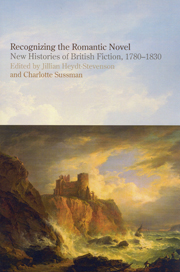Book contents
- Frontmatter
- Contents
- Acknowledgements
- Notes on Contributors
- Preface
- 1 ‘Launched Upon the Sea of Moral and Political Inquiry’: The Ethical Experiments of the Romantic Novel
- 2 Bad Marriages, Bad Novels: The ‘Philosophical Romance’
- 3 Enlightenment or Illumination: The Spectre of Conspiracy in Gothic Fictions of the 1790s
- 4 Burney's Conservatism: Masculine Value and ‘the Ingenuous Cecilia’
- 5 ‘All Agog to Find Her Out’: Compulsory Narration in The Wanderer
- 6 A Select Collection: Barbauld, Scott, and the Rise of the (Reprinted) Novel
- 7 Austen, Empire and Moral Virtue
- 8 Fanny Price's British Museum: Empire, Genre, and Memory in Mansfield Park
- 9 Between the Lines: Poetry, Persuasion, and the Feelings of the Past
- 10 Scholarly Revivals: Gothic Fiction, Secret History, and Hogg's Private Memoirs and Confessions of a Justified Sinner
- 11 Sympathy, Physiognomy, and Scottish Romantic Fiction
- Works Cited
- Index
10 - Scholarly Revivals: Gothic Fiction, Secret History, and Hogg's Private Memoirs and Confessions of a Justified Sinner
- Frontmatter
- Contents
- Acknowledgements
- Notes on Contributors
- Preface
- 1 ‘Launched Upon the Sea of Moral and Political Inquiry’: The Ethical Experiments of the Romantic Novel
- 2 Bad Marriages, Bad Novels: The ‘Philosophical Romance’
- 3 Enlightenment or Illumination: The Spectre of Conspiracy in Gothic Fictions of the 1790s
- 4 Burney's Conservatism: Masculine Value and ‘the Ingenuous Cecilia’
- 5 ‘All Agog to Find Her Out’: Compulsory Narration in The Wanderer
- 6 A Select Collection: Barbauld, Scott, and the Rise of the (Reprinted) Novel
- 7 Austen, Empire and Moral Virtue
- 8 Fanny Price's British Museum: Empire, Genre, and Memory in Mansfield Park
- 9 Between the Lines: Poetry, Persuasion, and the Feelings of the Past
- 10 Scholarly Revivals: Gothic Fiction, Secret History, and Hogg's Private Memoirs and Confessions of a Justified Sinner
- 11 Sympathy, Physiognomy, and Scottish Romantic Fiction
- Works Cited
- Index
Summary
Propelled by the unprecedented success of Walter Scott's Waverley novels, Romantic fiction assumed a new, more authoritative position in the literary field. It did so, as the example of Scott suggests, by way of an engagement with the past that answered to the period's widespread interest in questions of national history and national culture. Generic innovations such as Maria Edgeworth's and Sydney Morgan's national tales, along with Scott's more celebrated historical novel, placed the novel in new, more serious relation to scholarly and historical genres canvassing these questions, and moved novels themselves into the foreground of debates over national-cultural formation. Feeding into the innovations of the Romantic novel was the late-eighteenth-century genre of gothic, which itself saw a resurgence in the 1820s but whose relationship to scholarly and historical debates has largely been elided. Gothic novels may have scholarly trappings, but they are not generally read in relation to scholarly discourses and debates. These trappings are mostly seen as musty devices to launch the fiction's move into the more glamorous zone of romance, where the political, psychological and philosophical resonances that have attracted most critical attention achieve their fullest play. But the genre's explicit, if mischievous, positioning of itself on the terrain of learning deserves more serious attention, pointing to an intersection in the Romantic period between gothic fiction and questions of historical practice and publication that bears centrally on key debates in the period.
- Type
- Chapter
- Information
- Recognizing the Romantic NovelNew Histories of British Fiction, 1780-1830, pp. 267 - 284Publisher: Liverpool University PressPrint publication year: 2010

